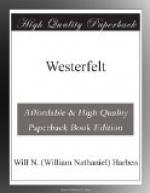That evening, as John Westerfelt was passing through the hall of the hotel to the dining-room, he met Harriet Floyd. She started when she saw him, and he thought she acted as if she wanted to speak to him, but just then some other boarders entered, and she turned from him abruptly. She sat opposite him at the table a few moments later, but she did not look in his direction.
On his return to the stable after supper, Washburn gave him a letter. He recognized Sue Dawson’s handwriting on the envelope.
“Is it a order?” asked Washburn, thinking it concerned the business.
“No, no; from a—a friend.” Westerfelt lighted a candle at the wick of Washburn’s lantern and went up to his room. He put the candle on a little table and sat down by it.
“I’ll never read another line from that woman,” he said. “I can’t. She’ll run me crazy! I’ve suffered enough.”
He threw the letter unopened on the table, and clasped his hands over his knee and sat motionless for several minutes. Then he picked up the letter and held one corner of it in the candle-flame. It ignited, and the blue blaze began to spread over the envelope. Suddenly he blew it out and tore the letter open. The margin of the paper was charred, but the contents were intact. It ran:
“JOHN WESTERFELT,—I heard you Come Nigh meeting yore Death. The Lord let you live to make you Suffer. The worst pain is not in the body But in the Soul. You will likely live a long time and never git over yore guilty suffering. The Report has gone out that some gal over thar tuk care of you while you wus down in Bed. Well, it would be jest like you to try yore skill on her. God Help her. I dont know her, nor nothin about her, but she ort ter be warned. Ef she loved you with all Her soul you would pick a Flaw somehow. Mark my words. You will live to See Awful Shapes when nobody else does. Yore Hell Has begun. It will Go on for everlastin and everlastin.
“SUE DAWSON.”
He put the letter into his pocket and went to the window and drew down the shade. Then he locked the door and placed the candle on the mantel-piece and stood an open book before it, so that his bed was in the shadow. He listened to hear if Washburn was moving below, then knelt by the bed and covered his face with his hands. He tried to pray, but could think of no words to express his desires. He had never been so sorely tried. Even if he could school himself to forgetting Harriet’s old love and the act of deceitfulness into which her love had drawn her, could he ever escape Mrs. Dawson’s persecutions? Would she not, even if he won and married Harriet, pursue and taunt him with the girl’s old love, as she had Clem Dill? And how could he stand that—he, whose ideal of woman and woman’s constancy had always been so high?




